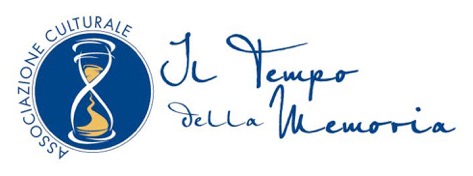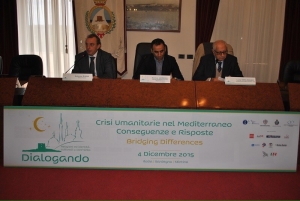Si riporta di seguito l’articolo relativo al Convegno Dialogando pubblicato sul sito web della testata giornalistica Khuamer.com.
The Humanitarian Crisis in the Middle East: Solutions and Consequences
“Dialogando” (in dialogue) was back again this year in the beautiful city of Stintino, a coastal commune in the Province of Sassari in the Italian Island Sardinia. The municipality of the Italian city opened on December 4, 2015 in cooperation with the “Gulf Mediterranean Forum” the second edition of the Conference “Dialogando” discussing “the Humanitarian Crises in the Middle East: Solutions and Consequences”. The conference featured participants from several countries in the Mediterranean region in search for solutions to the deepening terrorism crisis, which is claiming thousands of lives in the region.
Mr. Antonio Diana Mayor of Stintino opened the conference by welcoming the participants to his city and announcing his intention to create a “center for interfaith dialogue” in order to create a balanced dialogue between religions in order to find common ground in dealing with the aggravating refugee crisis on the one hand and the crisis of the terrorists on the other hand.
Mr. Diana concluded saying: “We wish to end a message from here, from Stintino, in an attempt to contribute to the solution of this crisis which we are all of suffering from.”
Dr. Hamzah Jammoul, researcher in conflict resolution and International relations and also one of the conference’s main organizers, stressed that “the crisis is a humanitarian crisis with political and legal dimensions”, proposing a number of questions: “What is the role of Italy in the face of this crisis? Is Italy’s role equivalent to that of China, Russia, and the US? Why did Italy do during the past years to contribute to the solution of this Mediterranean dilemma, especially for the Libyan and Syrian crisis?” Dr. Jammoul added that” Italy should assume a key role in the Mediterranean”, pointing out that this role should be of two parts, first to come up with a political framework to find a solution for the crisis in the affected countries and a second legal framework to find a solution to the influx of refugees to Europe and regularize their status.
Dr. Jammoul also pointed out to the ” absence of a clear vision on the issue of granting visas to refugees,” adding that “170 thousand refugees have arrived in Italy during the year 2015 where 450 thousand applied for asylum in Italy and the rest chose to move to other countries such as Germany and France, which indicated that Italy is also a transit country for these refugees”.
Meanwhile, Former Italian Minister of public instruction Mr. Luigi Berlinguer provided a different approach to the subject beginning with the need to “stop the terrorists by force, since the use of force in dealing with terrorists is part of the solution but it is not enough because they are in great numbers”. He also stressed that we should “rise up against this phenomenon … and we cannot allow history to write about our inability to find a solution to this humanitarian crisis.”
While Berlinguer called for an urgent solution to this crisis, he also pointing to the “the clash of interests between the rich and the poor.” He concluded by saying: “we have to find an immediate solution because the terrorists’ ability to recruit more is growing”.
For his part, Dr. Amer Al Sabaile, secretary general of the Mediterranean Gulf Forum, stressed that addressing the humanitarian crisis and reducing the phenomenon of asylum to Europe can only be part of a comprehensive plan to establish development and to fight terrorism. Within this framework, Dr. Al Sabaile highlighted that “counter-terrorism strategy cannot be a single strategy and bring about positive to this confrontation unless we have a unifying efforts rather than having multiple separated efforts. Confrontation with terrorism has reached a crucial stage that cannot be tolerated anymore, which requires a qualitative move towards bridging the gap between the international coalition and the Russian intervention, which has become a fait accompli and must be dealt with it according to the new political literature, which several US-led coalition member states are now dealing with on a reality basis”.
As for Mr. Henry Malosse, former president and member of the European Economic and social committee, he proposed the creation of a Mediterranean Union to follow up on the refugee crisis which concerns both the Arab Maghreb countries as well as the Middle East. Malosse also pointed out that with the deepening refugee crisis, the people of Europe have begun to lose confidence in their own governments, stressing that “the core of the crisis lies in the question: Are the European countries dealing with one another as a union? Or are they sustaining the notion of national sovereignty which is contrary to the concept of the Union?” He then pointed out that “Lebanon has received two million Syrian refugees while the total number of the Lebanese population is 4 million! If France would receive this percentage, the number of refugees in the French territory will be about 20 million refugees”, stressing the need to support the countries that host and receive the refugees.
For his part, the former Jordanian Information Minister Ali Alayed pointed out that the number of Refugees in his country amounted to twenty percent of the total population and that they live in a decent way and are engaged within the Jordanian society. The minister stressed that the Jordanian government is striving to ensure the needs of all refugees residing within its territory. He also called on Europe to play a greater role in order to find a radical solution, saying “we fight for peace and humanity…we fight for better conditions.”
Meanwhile, member of Italian Parliament and Foreign Affairs Committee in the Italian Parliament, Mariano Rabino that “a military solution cannot be the fundamental solution to the problem, but must be accompanied by a political solution,” stressing the need to “remove the Isis virus from Mosul and Raqqa”. He pointed to the existence of a problem “in the multifaceted European societies”, drawing attention to the fact that” those who are executing attacks in Europe should not be called upon as Arabs but on the contrary it should be noted that they had been brought up, received education and grew up in the European Environment”, concluding that “the problem is a social and cultural one, and the solution lies in the search for the roots of this problem”.
Ms. Elly Schlein, member of the European Parliament, for her part considered that “it is unfair to put the people escaping prison (refugees) in other prisons,” stressing the need to give them a margin of freedom. Schlein also called for “breaking down the network of smugglers who contribute to the deaths of hundreds per day out at sea” and continued to demand from the west “to stop their sale of arms which are ultimately used against us”. She finally concluded that “the time has come to put an end to policies that force us to buy oil from those who use the money to fund and support terrorists”.
On the same note, Dr. Hassan Jouni, professor of International Law, stressed that the West has to stop the exploitation of the wealth of the poor in the southern hemisphere while focusing on the need for a military intervention against terrorism because the political and negotiated solutions do not work with terrorists.
While, Dr. Sergio Giangregorio, president of the European center of orientation and studies, pointed to the close link between asylum and terrorism. He told a number of stories that he had heard from the refugees about the appalling conditions they experienced because of terrorists. He also drew attention to the large number of refugees who warned of the infiltration of terrorist into Europe under the pretext of humanitarian asylum.
He also said that “the goal of the arrival of these terrorists to Europe is to create radical movement of Islam”, holding Turkey the greater responsibility of asylum at sea and the infiltration of terrorists into Europe as well. He stressed that “the massacre of Paris proved that there is a center of evil in the world is planning to spread evil everywhere which has become an intellectual reference for these jihadists.”
Meanwhile, Admiral Mario Rino Me utilized his military experience in the Italian Navy to explain some of the details relating to the military and humanity aspects of the war on Syria. He said that the “Arab Spring awakened European countries, which expects to this spring to blossom freedoms”, noting however that “a vacuum of power produced by this spring was somewhat covered up by countries living within rival identities”. Admiral Rino Me concluded that “the surge of terrorism came along to initiate a sectarian conflict”, stressing that “what is going on has nothing to do religions and cultures, it’s rather linked to the issue of controlling the world.”
Fonte: Dialogando – Khumaer.com

